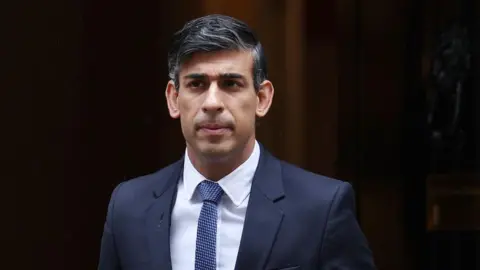A landmark moment for Rishi Sunak, but uncertainty abounds
 EPA
EPAFor Rishi Sunak, strikes against the Houthi rebels mark a landmark moment of his premiership.
The decision to commit the UK to military action is a landmark moment in any prime minister's tenure in office.
The government has the prerogative to do this without wider political consultation.
But in this instance, ministers concluded there was sufficient time to brief the cabinet, Labour leader Sir Keir Starmer, Shadow Defence Secretary John Healey and Speaker of the House of Commons Sir Lindsay Hoyle before any strikes began.
Sir Lindsay and Mr Healey attended a briefing in person in Whitehall. Sir Keir joined the briefing remotely.
'I understand the briefing was conducted by the Deputy Prime Minister Oliver Dowden.
These conversations are a courtesy. But they are more than a courtesy.

More on the US-UK strikes in Yemen

Ministers are aware of the scepticism, in parliament and beyond, about the wisdom, or lack of it attached to British military operations over recent decades.
Take the Conservative MP Neil O'Brien, until very recently a minister himself.
Writing on social media, he said: "Given our main interventions of the last 25 years have been failures, let's be clear up front: What counts as success? Realistically, how far [would] we need to go to achieve this? How will we avoid being dragged into something we don't want?"
For his part, the prime minister said in a statement that the Houthi attacks "cannot stand".
He continued: "The United Kingdom will always stand up for freedom of navigation and the free flow of trade. We have therefore taken limited, necessary and proportionate action in self-defence".
And it is likely there will be a statement and a debate in the Commons, perhaps on Monday, with the government pressed to elaborate on just these kind of points: what it hopes to achieve, by when and at what cost.
Not soon enough, some will argue. We have already heard from the Scottish National Party, the Liberal Democrats and Plaid Cymru.
The Lib Dems and Plaid say it is wrong that parliament has been bypassed.
The SNP leader in Westminster, Stephen Flynn, said: "It is incumbent upon the UK Government to appraise Parliament as soon as possible and MPs must therefore be recalled to Westminster".
This moment has looked increasingly likely: a military response to match the rhetoric threatening just that.
It was impossible not to join the dots when Defence Secretary Grant Shapps was asked on Wednesday about the prospect of military action against Houthis and said: "Watch this space."
He could have ducked the question. He instead implied something was coming.
So, what next, diplomatically, geopolitically, militarily and economically?
There are risks associated with action. And risks associated with doing nothing.
The risk of a wider conflict in the Middle East? A further shrivelling of shipping traffic through the Red Sea, a vital artery of the world economy? Let's see.
And all this after the twin global shocks of the war in Ukraine and the Covid pandemic.
More uncertainty beckons; unknown consequences abound.

Sign up for our morning newsletter and get BBC News in your inbox.

